MDI Wheelers Helps People Unable to Ride a Bike Get Out on Acadia’s Carriage Roads
July 24th, 2023
July 24th, 2023
BY SHANNON BRYAN
Ed Wood finds bike riding on Acadia’s carriage roads to be magical.
For years he regularly biked miles in the park with friends, marveling at the views while the carriage road gravel crackled under his bike tires and sunlight flickered through the tree canopy.
“Riding on Acadia National Park’s carriage roads has always been a great blessing to me,” he said. “The park is a unique gem. It’s one of the great assets of the U.S.”
Twelve years ago, Wood was diagnosed with Parkinson’s disease. Among his symptoms over the years, he found his balance progressively worsened, so he switched to an electric-assist recumbent bike. Around that same time, Wood met Rick Smith who had experienced a devastating stroke 10 years ago.
Wood turned Smith on to the electric-assist recumbent, and that changed everything.
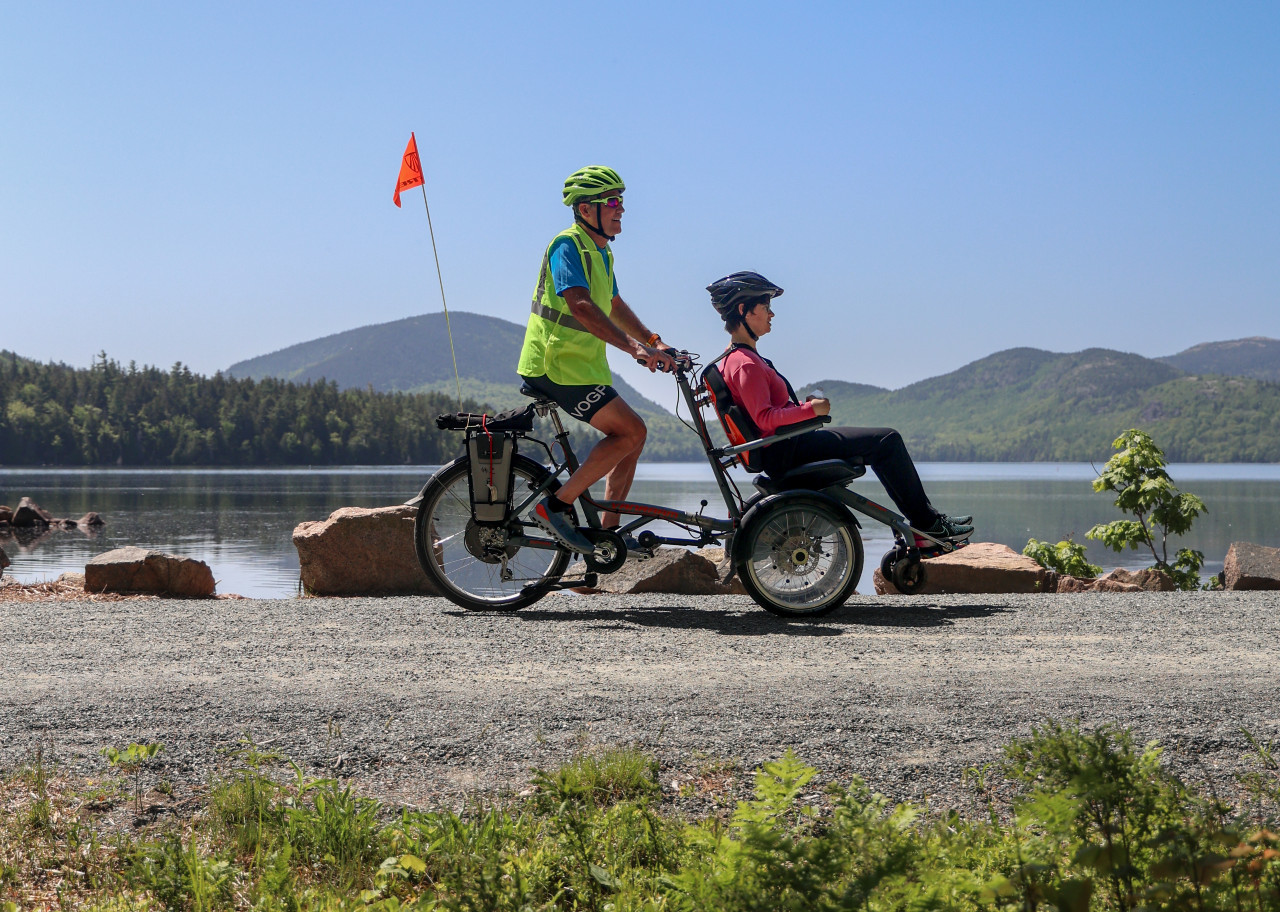
Winston Holt of Seal Harbor, ME, bicycles Marty Mendis during a ride on the carriage roads surrounding Eagle Lake during an outing with the MDI Wheelers. (Photo by Sam Mallon/Friends of Acadia)
“Ed and I were out on the carriage roads laughing and even crying – it was so enjoyable,” said Smith. They were soon joined by George Woolley, who’s living with a chronic neurological condition that affects his balance.
Friends Art Worster and Dave Edson rode along as safeties. Since Wood and Smith both live in the town of Tremont on Mount Desert Island (MDI), the group was aptly dubbed “Tremonsters.”
“It’s been a joy to discover adaptive biking and get back on the carriage roads with my good friends,” said Woolley.
“These bikes gave me the chance to get back into the park,” said Smith, who adds that it’s also wonderfully therapeutic. “Riding in the park again has been great therapy for me. It makes me feel whole again.”
Eventually, though, Wood’s Parkinson’s made riding even the recumbent unfeasible, and Wood thought his rides on Acadia’s carriage roads had reached their end.
But the Tremonsters – Wood’s caring and determined group of friends – are a generous lot who believe the splendor of Acadia’s carriage roads are for everyone. They wanted to make sure Wood could still get out for a ride.
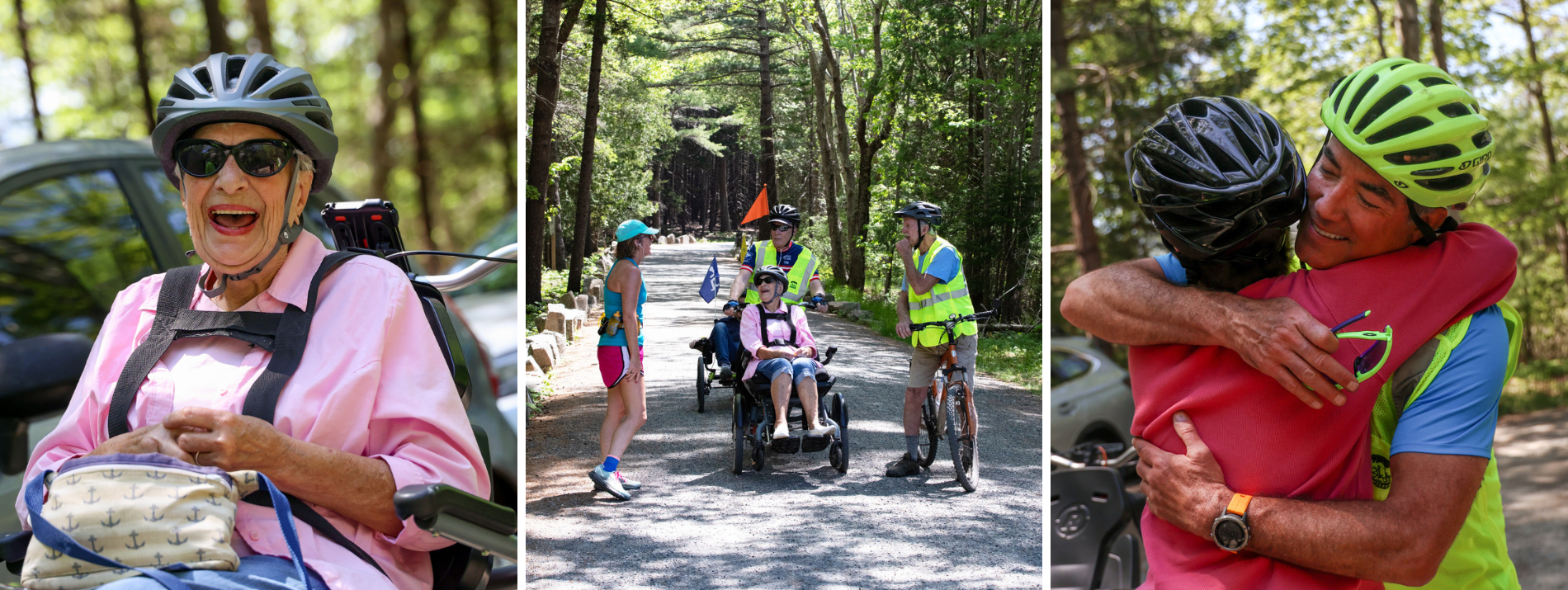
Gloria Higgins has a huge smile after her first ride with the MDI Wheelers. (Photo by Sam Mallon/Friends of Acadia) The “pod” stops to chat with other park visitors. (Photo by Julia Walker Thomas/Friends of Acadia) Winston Holt hugs Marty Mendis after taking Mendis on a ride. (Photo by Sam Mallon/Friends of Acadia)
Thus began MDI Wheelers, born from a perfect blend of solution-finding and serendipity. Now that group of friends has formed a 501(c)3 nonprofit in hopes to help more people from the community who are unable to ride a bike get out on Acadia’s carriage roads with adaptive bikes.
MDI Wheelers is an entirely volunteer organization, propelled by dedication and generous donors. Tremonsters Dave Edson (also a Friends of Acadia board member), Art Worster, Ed Wood, and Rick Smith all serve on the MDI Wheelers board of directors, along with Janet Wood, Linda Woolley, and Josie Briggs.
They’ve benefited from support from Portland Wheelers, an organization with a similar mission in southern Maine. Started in 2015, Portland Wheelers organizers have been generous with sharing their expertise.
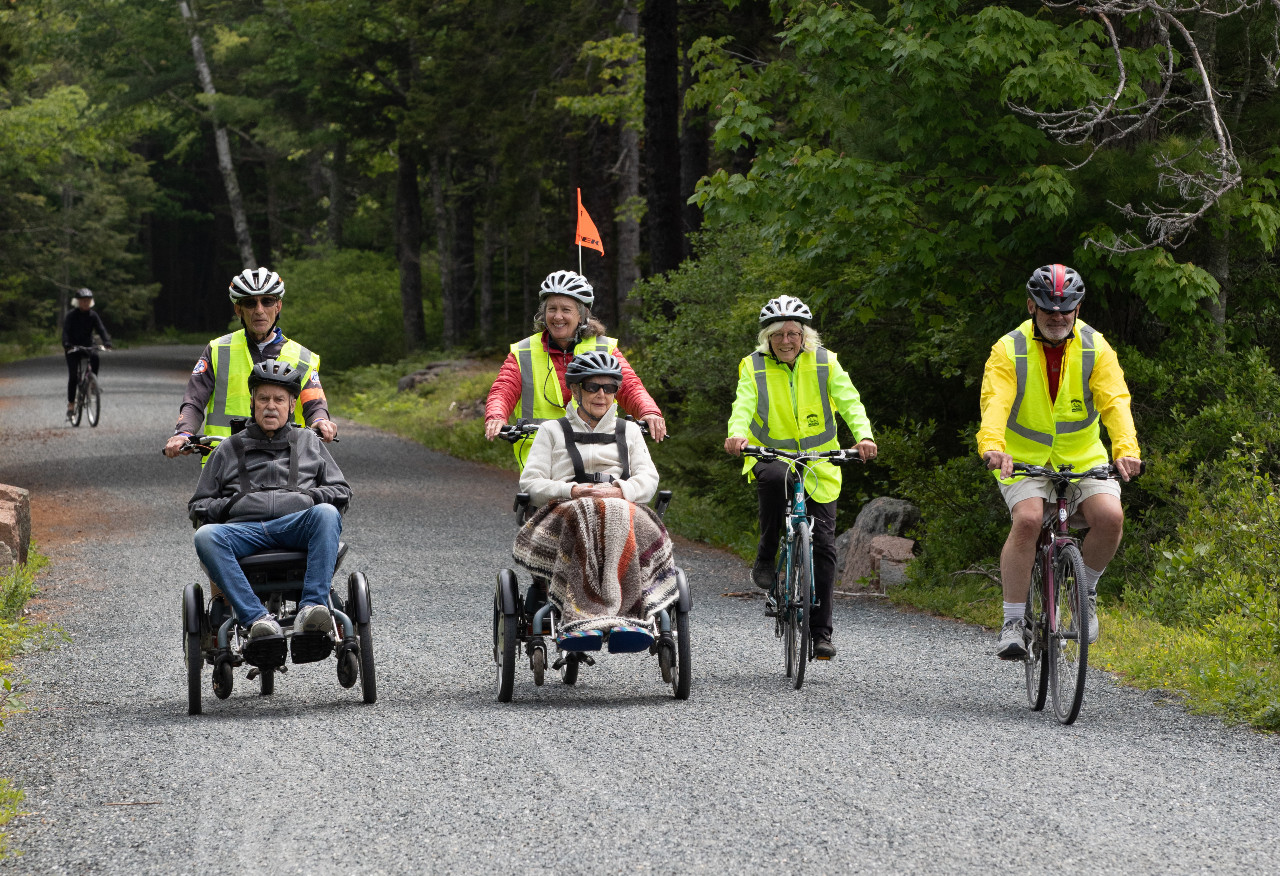
MDI Wheelers volunteers and riders enjoy the carriage road near Eagle Lake. Pictured from left to right are Dean Read as pilot with George Woolley; Elly Andrews pilot with Emily Russell and safeties Josie Briggs and Dave Edson. (Photo by Julia Walker Thomas/Friends of Acadia)
Two years ago, MDI Wheelers purchased their first OPair electric-assist wheelchair tricycle, or E-trike, at a discounted rate from Portland Wheelers. They purchased a second last year, thanks to an anonymous donation.
The E-trikes have three wheels for stability (one in the back, two in the front) and feature a wheelchair-like seat in the front for a rider. The “pilot” pedals from the back seat and has an overview of the road and the rider.
The bikes are class 1 trikes, which is the model with the least powerful electric motor and the only kind allowed on Acadia’s carriage roads. The park has also granted MDI Wheelers with a special-use permit for their rides. And Friends of Acadia recently donated funds to purchase a trailer to haul the trikes.
With the safety and comfort of riders a top priority, MDI Wheelers dedicated last season to hosting 20 “proof of concept” rides to work out logistics and learn best practices. On one of those rides was a longtime Friends of Acadia member who was able to visit a trail in Northeast Harbor that has great importance to her family. Had it not been for MDI Wheelers, she would have missed her first visit in the last 16 years.
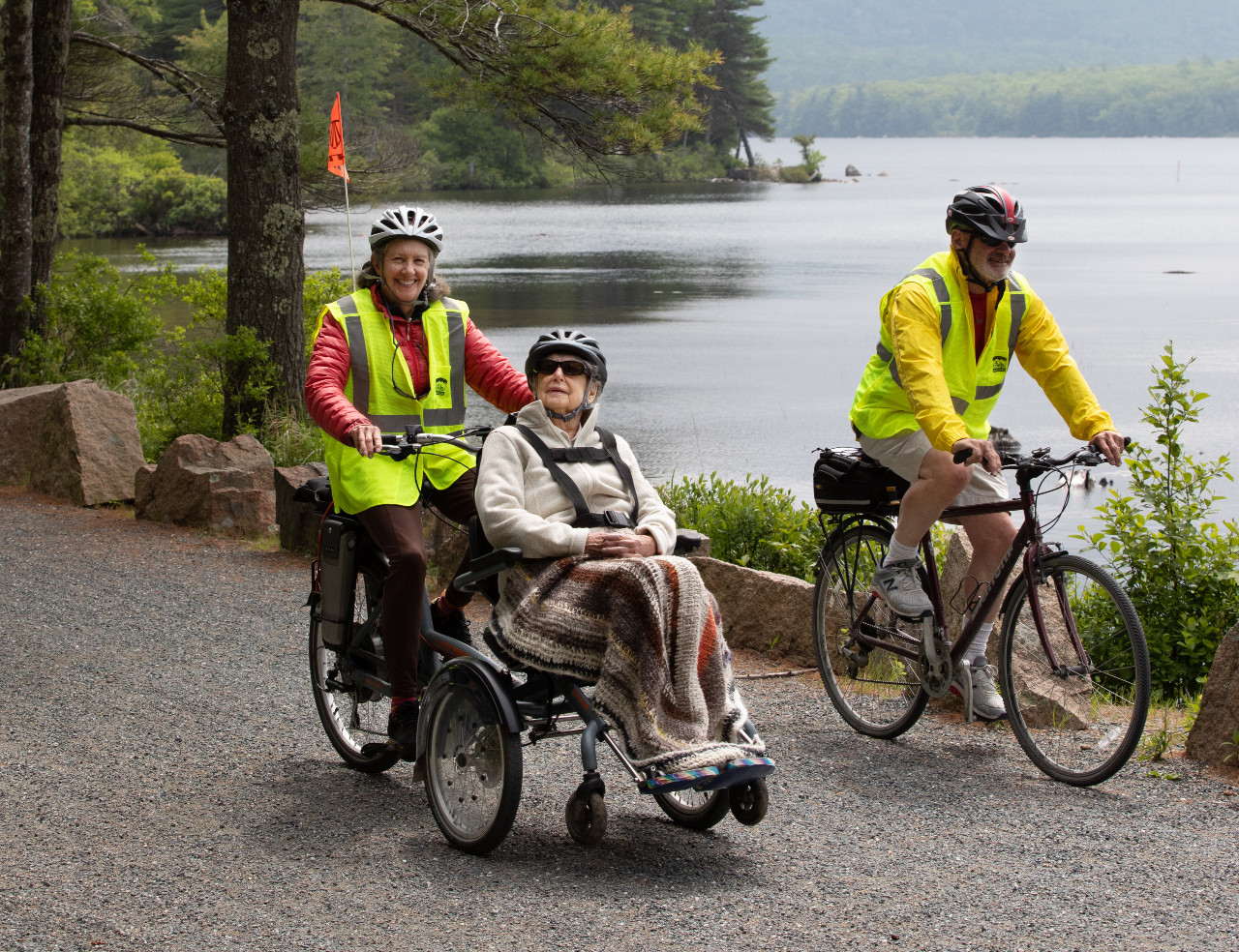
MDI Wheelers volunteers, Elly Andrews as pilot and Dave Edson riding along as safety, cycle with Emily Russell of Bernard. (Photo by Julia Walker Thomas/Friends of Acadia)
MDI Wheelers have also been training volunteers – 16 as of this May – to serve as pilots and safeties (safeties ride with the E-trikes). They team up on the carriage roads in a “pod” consisting of two riders and two pilots on the two E-trikes, along with two safeties who ride their own bikes.
Rides are slow and gentle and will mostly take place on the carriage roads around Eagle Lake and Paradise Hill, although Edson notes that routes will vary to help ensure riders and volunteers maintain enthusiasm. Rides are also always free.
“We want not only riders but volunteers to benefit from this,” said Edson. “They will get as much out of this as the riders:’
This season, the MDI Wheelers aim to offer bi-weekly rides to people in the community and are working with Birch Bay Retirement Village and the Ellsworth and MDI Housing Authorities. They’re quick to note that while enthusiasm is high, there is still much to learn and they’re taking it slowly and focusing locally.
MDI Wheelers can’t provide transportation to and from the carriage roads. “That is a limitation that is most evident,” said Edson. For now, they’re welcoming volunteers, particularly for administrative and fundraising assistance. And they’re providing people engaging experiences in Acadia that felt out of reach to some just a couple of years ago.
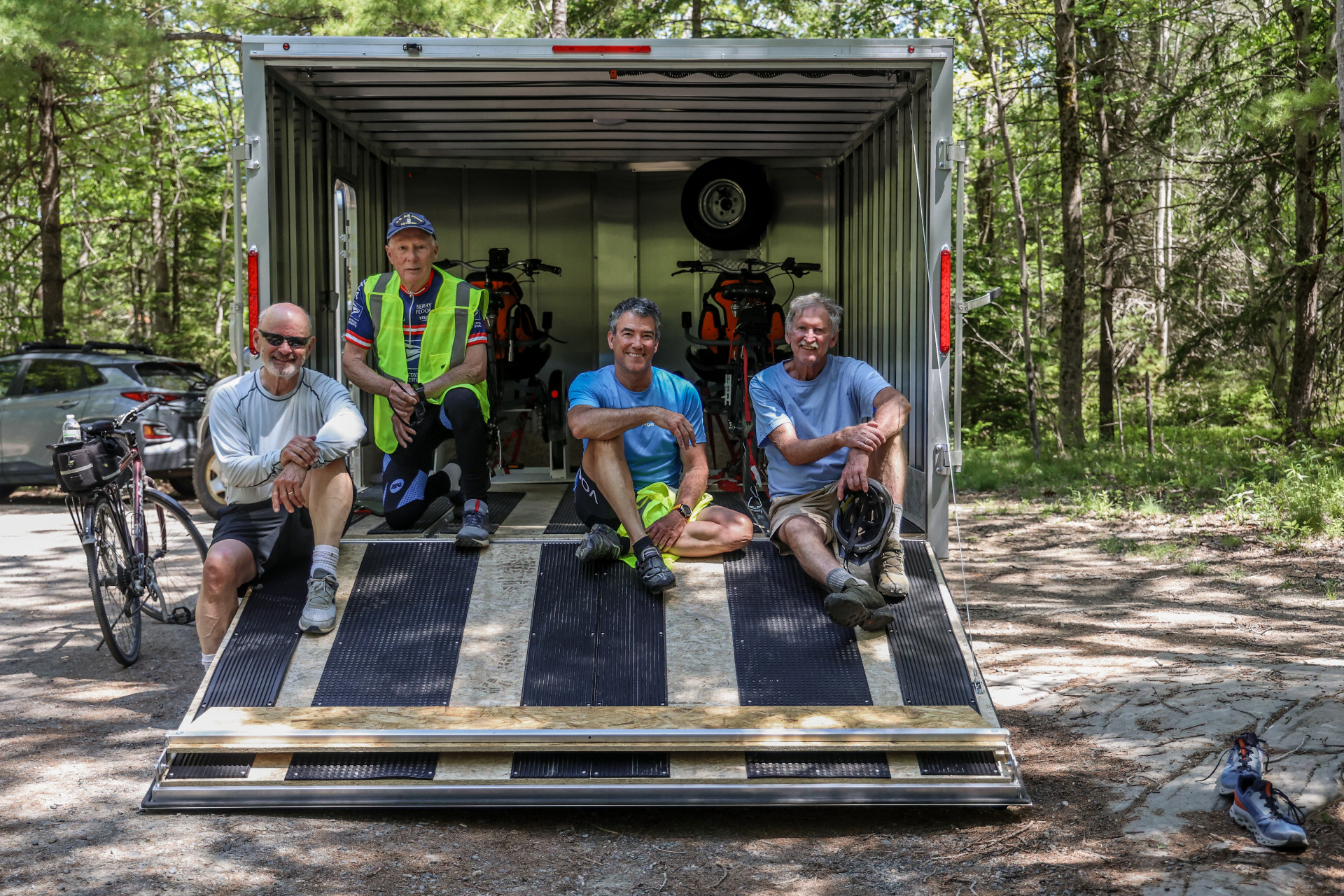
Dave Edson of Tremont, ME, Art Worster of Seal Cove, ME, Winston Holt of Seal Harbor, ME, and Jake Jacobson of Mansel, ME, all volunteers with the MDI Wheelers, relax after a ride around the carriage roads by Eagle Lake. (Photo by Sam Mallon/Friends of Acadia)
“It’s important how vital public space is. Nature brings people together;’ said Smith. He adds that it’s vital that public spaces be accessible to everyone, and that’s a driving force for MDI Wheelers and the program’s potential. Perhaps MDI Wheelers could help lead the way for other national parks; that’d be icing on the cake.
“If the program doesn’t go anywhere else, so be it. But if it does, we feel honored to just help initiate it;’ Smith said. “Ed has been the inspiration to keep going.”
Either way, this collaborative effort has already brought the magic of Acadia’s carriage roads back to the lives of Ed Wood and others who treasure it.
“It’s been a great feeling,” Wood said. He describes riding on the carriage roads a “return to childhood” that raises his spirits. “They opened a door I thought was permanently closed,” he added. “I’m very grateful to my friends.”
For more information about donating or volunteering, visit mdiwheelers.org.
SHANNON BRYAN is Friends of Acadia’s Content and Website Manager.